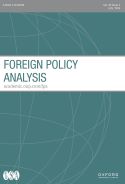Role Theory, Non-Coercive Influence, and the Agency of Target States: The Case of Kazakhstan’s Ambassadorial Corps and the Russian Diplomatic Academy
Role Theory, Non-Coercive Influence, and the Agency of Target States: The Case of Kazakhstan’s Ambassadorial Corps and the Russian Diplomatic Academy
- John Stanko
- Publication Date
July 2024 - Website
- View Publication Information
This article contributes to foreign policy analysis by applying role theory to the study of soft power, evaluating the relationship between a state’s chosen international role(s) and susceptibility to non-coercive influence. I argue that in countries where said role involves committed engagement with varied power poles, elites derive benefits from their various partners and thus abide soft power bases such as the Russian Diplomatic Academy (RDA) without violating the principle of autonomy maximization. I utilize a mixed methods approach, using logistic regression as part of a qualitative case study of Kazakhstan. Drawing on an original dataset of Kazakhstani ambassadors since 1992, I find that foreign policy role better explains the continued presence of RDA-trained diplomats within the Kazakhstani ambassadorial corps than traditional security arguments. This outcome demonstrates the promise of examining soft power through the lens of role theory, with an emphasis on the agency of potential targets of influence.
 The College of Arts
The College of Arts